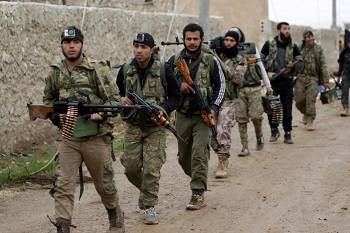The Russian government has turned a blind eye to repeated ceasefire violations in Syria by the Assad regime, a Syrian opposition representative said Monday in Geneva.
“Russia tried to take opposition groups under its control, but failed,” said Muhammed Alloush, a representative of the Jaish-al-Islam faction and a member of the opposition High Negotiation Committee (HNC) who is attending ongoing Syria talks in Geneva.
Speaking to Anadolu Agency on the sidelines of the fourth round of the Geneva talks, Alloush said the committee had submitted a detailed peace proposal to the Assad regime during separate talks held last month in Astana.
Syrian opposition and regime representatives met in the Kazakh capital on Jan. 23 and 24 to discuss the terms of a ceasefire brokered earlier by Turkey and Russia.
Alloush noted that opposition demands included guaranteeing the ceasefire, releasing prisoners and lifting regime embargoes off opposition-held parts of Syria.
“During the second Astana talks on Feb. 6, the government presented us with other documents [i.e., proposals], while we awaited a reply to our proposal,” he added.
“If we submit a document, we [both parties] should discuss it. [One side] shouldn’t simply reply with another document,” Alloush explained.
He added: “Russia found our proposal to be the more detailed one. They told us that issues mentioned in the documents would be discussed in Ankara -- one by one -- within next two days.”
“We didn’t participate in the last session of the second round of the Astana talks,” Alloush said. “It was at that point that Russia promised to halt its bombardments [in Syria]. The Kazakh deputy foreign minister witnessed this. But Russia did not fulfill its promise.”
According to Alloush, his delegation provided Russian officials in Astana with a report on a proposed ceasefire-monitoring mechanism. “But they [Russian officials] told us the proposal ‘violated international law’,” he said.
“When we asked them how it contradicted international law, they couldn’t answer us,” he said. “They told us, ‘The regime rejected these chapters [of your proposal]’. So we told them, ‘Let's discuss whatever chapters they [the regime] accepted’. They couldn’t answer this either.”
“We presented our proposals to the delegations from the UN and from other countries,” Alloush explained. “They praised our documents [i.e., proposals].”
Regarding Russian strategy in Syria, the opposition representative said Moscow was either unable to influence Syria and Iran or “they are aiming for some political settlement”.
“They [the Russians] gave the green light to the regime after failing to exploit us [for their own interests],” he said. “They want to co-opt the opposition as they have the regime.”
“The regime doesn’t want ceasefire. It feeds on blood. If there’s a ceasefire, the regime will die,” Alloush asserted. “Assad did not take a serious approach to the negotiations.”
He also alleged that the Syrian regime had carried out terrorist attacks on its own forces during the peace talks “with a view to imposing its interpretation of terrorism”.
“The government’s theatrics in Homs was a good example of this,” he said, referring to recent terrorist attacks on a military base located in Homs.
Syrian regime delegation head Bashar Jaafari, who is also Syria’s permanent representative to the UN, called on UN Syria envoy Staffan De Mistura to condemn the attacks.
“Should we not condemn the killing of civilians, the imprisonment of thousands of women, the targeting of people by chemical weapons, and the forcible displacement of millions of people?” Alloush asked.
The Syrian regime, he went on to assert, was the “main partner” of ISIL, while the terrorist group represented the regime’s “biggest supporter”.
“We told the Russians that we had documents showing cooperation between Russia, the Syrian regime and ISIL,” he said. “And the Russians answered, ‘Yes, we know’.”
The opposition representative went on to reject the presence in Syria of Shia militias.
“Lebanon’s Hezbollah, the Iraqi Hezbollah group, the Al-Nujaba movement, the Zaynabiyun [Shia groups from Pakistan] and the Fatemiyoun [an Afghan Shia militia] should leave [Syria] immediately,” he asserted. “It is meaningless to expel only one group,” he added, referring to the Al-Nusra Front.
He went on to stress that the future of Syria would be positive only if Assad left the political stage. “Otherwise, it will be impossible [to achieve peace]”, he said.
The fourth round of talks in Geneva kicked off on Feb. 23. According to De Mistura, talks are being held within the framework of UN Security Council Resolution 2254, which calls for a transitional administration once opposition and regime delegations finalize details of the negotiations.
According to the UNSC resolution, negotiations should be completed within six months with a view to establishing the sought-for interim administration. Then a new constitution must be drawn up and elections held within the following 12-month period.
Syria has been locked in a vicious civil war since early 2011, when the Assad regime cracked down on pro-democracy protests -- which had erupted as part of the “Arab Spring” uprisings -- with unexpected ferocity.
Since then, more than a quarter of a million people have been killed -- and as many as 10 million displaced -- across the war-battered country, according to UN figures.
PHOTO CAPTION
Opposition fighters walk carrying their weapons on the outskirts of the northern Syrian town of al-Bab, Syria January 15, 2017. REUTERS
Worldbulletin


 Home
Home Discover Islam
Discover Islam Quran Recitations
Quran Recitations Lectures
Lectures
 Fatwa
Fatwa Articles
Articles Fiqh
Fiqh E-Books
E-Books Boys & Girls
Boys & Girls  Ramadan
Ramadan Fatwa Audios
Fatwa Audios Month of Mercy
Month of Mercy Women
Women Eed Al- Fitr
Eed Al- Fitr Food Recipes
Food Recipes Videos
Videos

 Prayer Times
Prayer Times












